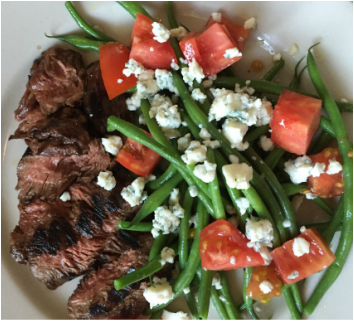 A typical meal eaten by Dr. Gorczynski as part of a low-carbohydrate, high-fat diet. This is a moderate protein diet. A typical meal eaten by Dr. Gorczynski as part of a low-carbohydrate, high-fat diet. This is a moderate protein diet. A common misconception many people have is that people on a low-carbohydrate diet only eat meat. Although "meat only" diets have been studied, and actually have been found to be safe, this is not at all what I suggest. In fact, a well formulated low-carbohydrate diet should really be considered a low to moderate protein diet. Again, we need to strive to get the majority of our calories from fat. I will discuss healthy fats in the next article. Proteins are made up of chains of amino acids. The process of digestion breaks ingested proteins down into amino acids. These amino acids can then be used by your body to make specific proteins needed structurally (bone, muscle) and to support cellular function via signaling and enzymatic activity. Amino acids can also be used for energy or stored as body fat. Of the 20 amino acids used in the human body, 9 are essential. This means they must be eaten. The body can fabricate the other 11 if needed. A complete dietary protein contains all of the essential amino acids. Meat is a complete protein. Incomplete proteins can also be eaten in combination to supply all essential amino acids. This is how vegetarians can ensure proper protein intake. The amount of protein an individual needs is based on the normal turnover of proteins in their body each day. Larger body mass and an increased activity level require increased protein intake. Eating protein beyond this point is not beneficial and could significantly undermine weight-loss efforts. Some amino acids will cause an insulin release. As I discussed in the last blog posting, we are attempting to minimize our insulin levels to allow our body fat to be mobilized for energy, and to stop the blood sugar instability that leads to cravings. For these reasons, it is best to eat the proper amount of protein (a moderate level) for your body and activity level. How much is that? Adequate protein intake for most people is 0.3-0.8 grams of protein per pound of ideal body weight. I often use 0.5 grams as a simple rule of thumb. So this means if your ideal body weight is 150 pounds, you should strive for about 75g of protein over the day. To maximize weight loss, especially if not exercising, aim for the lower end at about 50 grams. Some body-builders consume several times this amount of protein, but their goals are completely different than ours. We are not trying to pack on as much muscle as possible, we are trying to burn body fat for energy while maintaining our muscle mass and optimizing the function of our cells. To put this in perspective, a six ounce steak has about 50 grams of complete protein. A five ounce serving of salmon will deliver 36 grams of protein. A single large egg or a handful of almonds each contains 6 grams of protein. One slice of cheddar cheese will provide 7 grams of protein. Vegetables also contain protein, but at a much lower concentration. As I will further develop in the future, my recommended diet is not vegetarian, but it does contain lots of vegetables. The biggest volume of food you should be eating is non-starchy vegetables, while the biggest source of calories will ultimately be dietary fats. When eaten in significant quantity, vegetables will actually end up supplying a reasonable amount of protein. A common misconception that has been beaten into our heads is that "lean" meats are best. We have been trained to fear fat. For this reason, many people instinctively think of chicken breast, or tuna as excellent protein sources. And they are. But not for optimal body-weight, health, and performance. Why is this? Because they contain no fat. Just 3 ounces of cooked tuna supplies 25 grams of protein, but only 5 grams of fat. Even worse, a half of a chicken breast contains 27 grams of protein and just 3 grams of fat. Remember, we want our body to burn fat, thus we must eat fat. Take home points: 1: Low-carbohydrate does not automatically mean high protein. 2: It is easy to supply your body with adequate protein by consuming a variety of foods. 3: Don't fall into the "lean meat" trap. Lean meats over-supply protein, and under-supply fat. Choose the fattiest cuts of meat and don't feel guilty. 4: When you do choose to eat a lean meat like chicken or non-fatty fish, keep the portion size small, and feel free to add plenty of butter, cream, or olive oil to the sauce.
3 Comments
jane
11/14/2016 12:29:09 am
Very helpful. I see I'm eating too much protein with an ideal b.w. of 130, I should cut down there.
Reply
Barbara Powell
1/10/2017 11:54:25 am
How is an Ortho doctor giving advise about diet intake.
Reply
1/10/2017 06:18:24 pm
My very first blog posting in the orthopedic diet/nutrition section of this website attempted to answer this very question.
Reply
Your comment will be posted after it is approved.
Leave a Reply. |
Dr. GorczynskiOrthopedic Surgeon focused on the entire patient, not just a single joint. Categories
All
|

 RSS Feed
RSS Feed